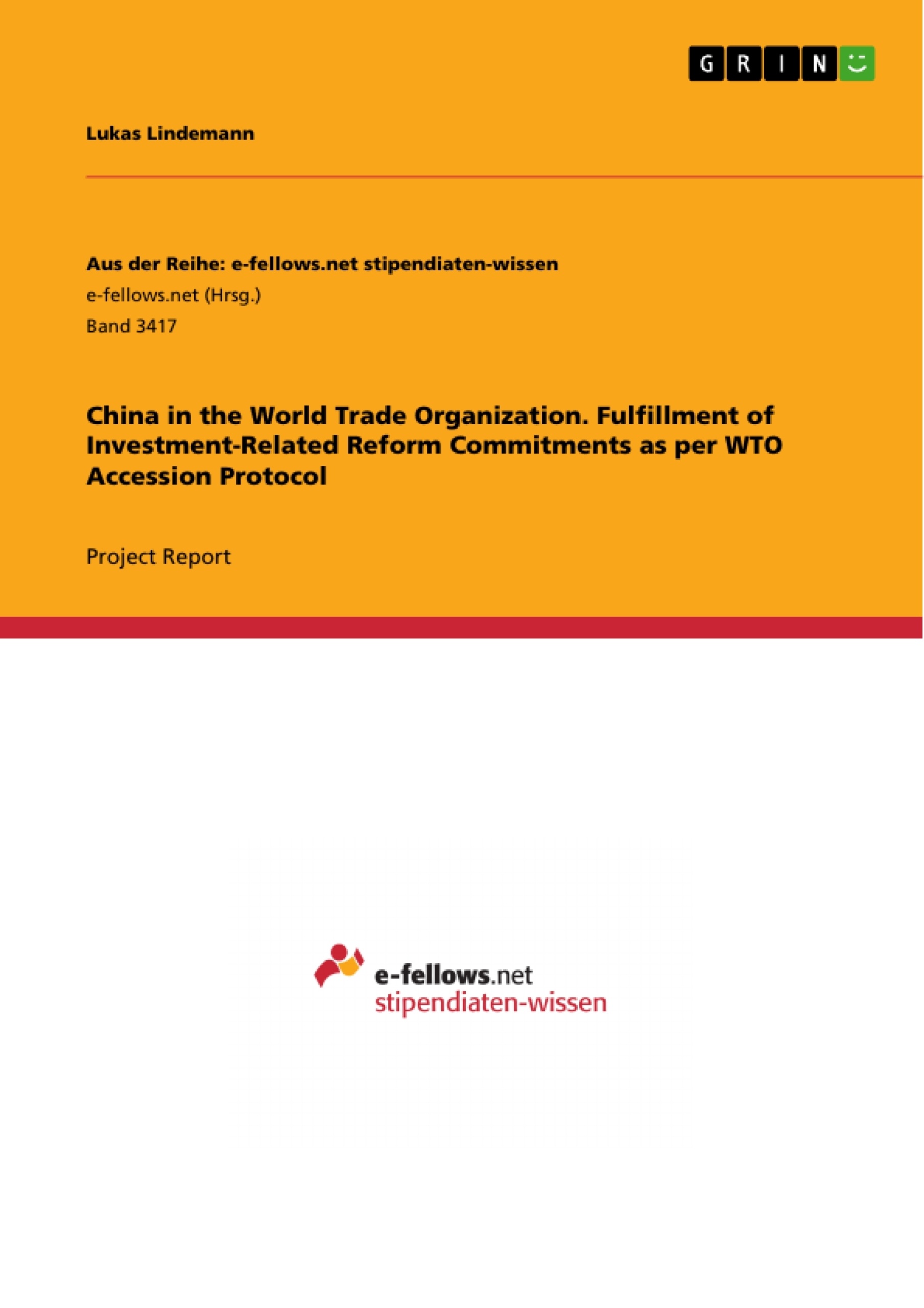The paper examines whether China fulfilled its reform commitments as set out in the WTO Accession Protocol for China and its appendixes. The paper focuses on investment-related reform commitments (non-discrimination/national treatment, forced technology transfers, intellectual property regime, SOEs and subsidies).
China has been exposed to criticism that the requirements and obligations set out in the WTO protocol have not been fully met. China has faced backlash for the unequal treatment of foreign companies compared to domestic companies, for instance regarding market entry conditions, forced transfers of technology and know-how, the protection of intellectual property rights, the award of contracts in public tender procedures and access to financing. The People’s Republic of China was also accused of strong state intervention and SOE subsidies to enable highly competitive prices in global trade, for example causing dumping prices. Arguably, this public opinion has gained even more traction due to the ongoing US-China trade war, with US-American punitive tariffs on Chinese exports exceeding US$ 500bn by 2020.
Inhaltsverzeichnis (Table of Contents)
- Introduction
- Problem and Objectives
- Methodology
- Domestic View: Economic Reform Era
- Reform Developments between 1949 and 1975
- Reform Developments between 1976 and 2000
- International View: China in the WTO
- WTO at a Glance
- Accession Process
- Accession Protocol and Investment-Related Reform Commitments
- Compliance Analysis: Fulfillment of WTO Reform Commitments
- Contemporary Legal Framework
- New Foreign Investment Law (FIL)
- Catalogues of Restricted Industries
- Catalogue of Encouraged Industries
- Compliance of Investment-Related Reform Commitments
- Conclusion and Outlook
Zielsetzung und Themenschwerpunkte (Objectives and Key Themes)
This term paper examines China's accession to the WTO and assesses the fulfillment of selected investment-related reform commitments. It explores the domestic economic reform era in China and its trajectory leading up to WTO membership. The paper delves into China's accession process and the specific commitments made in the accession protocol, particularly focusing on investment-related reforms. The analysis investigates the contemporary legal framework in China and assesses the extent to which the country has met its WTO obligations regarding foreign investment.
- China's economic reform era and its trajectory towards WTO accession
- China's accession to the WTO and its commitments to investment-related reforms
- Analysis of China's contemporary legal framework regarding foreign investment
- Evaluation of China's compliance with WTO obligations regarding foreign investment
- Assessment of the fulfillment of selected investment-related reform commitments
Zusammenfassung der Kapitel (Chapter Summaries)
The introduction outlines the problem and objectives of the paper, which are to assess China's fulfillment of selected investment-related reform commitments made during its accession to the WTO. The chapter also discusses the methodology used in the analysis. The second chapter examines the domestic economic reform era in China, covering the periods between 1949 and 1975, and 1976 and 2000. The third chapter provides an overview of the WTO, focusing on its accession process and the specific commitments made by China in the accession protocol related to investment reforms. The fourth chapter delves into the contemporary legal framework for foreign investment in China, examining the New Foreign Investment Law, the catalogues of restricted and encouraged industries, and the compliance of investment-related reform commitments with WTO obligations.
Schlüsselwörter (Keywords)
This paper focuses on key themes related to China's accession to the WTO and its investment-related reform commitments. Key concepts include foreign direct investment (FDI), accession protocol, WTO compliance, reform commitments, legal framework, restricted industries, encouraged industries, and the New Foreign Investment Law (FIL).
Frequently Asked Questions
Did China fulfill its WTO investment-related reform commitments?
The paper evaluates China's compliance with its WTO Accession Protocol, focusing on areas like non-discrimination, forced technology transfers, and intellectual property rights, noting both progress and ongoing criticism.
What is the New Foreign Investment Law (FIL) in China?
The FIL is a central part of China's contemporary legal framework aimed at improving the business environment for foreign companies and addressing WTO concerns regarding national treatment.
Why has China faced backlash from foreign companies?
Criticism often centers on unequal treatment compared to domestic State-Owned Enterprises (SOEs), forced transfers of know-how, and insufficient protection of intellectual property rights.
What are "Catalogues of Restricted and Encouraged Industries"?
These are regulatory lists used by the Chinese government to manage foreign direct investment (FDI), specifying which sectors are open, restricted, or specifically encouraged for international investors.
How did the US-China trade war influence the WTO debate?
The trade war amplified public and political traction regarding China's alleged state interventions and subsidies, leading to punitive tariffs and increased pressure on China to meet its WTO obligations.
- Quote paper
- Lukas Lindemann (Author), 2020, China in the World Trade Organization. Fulfillment of Investment-Related Reform Commitments as per WTO Accession Protocol, Munich, GRIN Verlag, https://www.grin.com/document/889206



